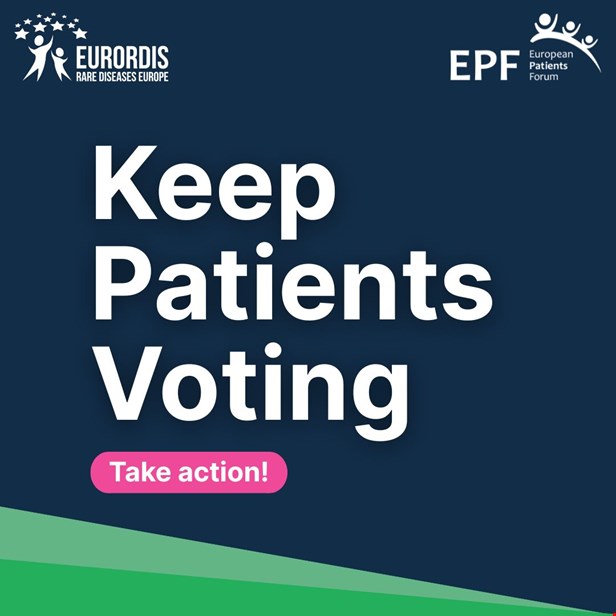Press release: Patient organisations call for guarantee of voting rights and meaningful involvement at the EMA

Brussels, 12 June 2025 – As the EU’s general pharmaceutical legislation enters a decisive phase, more than 70 additional patient organisations have joined EURORDIS–Rare Diseases Europe and the European Patients’ Forum (EPF) in calling on EU policymakers to safeguard strong and meaningful patient involvement at the European Medicines Agency (EMA) – including the retention of patient voting rights in the Committee for Medicinal Products for Human Use (CHMP).
In a joint statement first published on 10 March 2025, EURORDIS and EPF warned that Council negotiations risked removing patient representatives’ voting rights in the CHMP and reducing the number of voting patient members in the Pharmacovigilance and Risk Assessment Committee (PRAC) – the two EMA committees responsible for authorising and monitoring medicines in Europe.
The European Commission’s original proposal marked a milestone in formalising patient involvement in EU medicines regulation, introducing provisions for four patient representatives with voting rights on the CHMP and two on the PRAC. However, the Council agreement adopted on 4 June significantly weakens these provisions. It falls short of both the Commission’s ambition and the European Parliament’s position adopted in April 2024 in terms of patient involvement.
For over 25 years, patient representatives have contributed their lived experience to EU regulatory processes. Their insights strengthen trust, ensure that medicines respond to real-world needs, and complement clinical and scientific expertise.
Reducing patient involvement or removing voting rights would not only undo decades of progress – it would send a damaging signal that patient perspectives are no longer valued in decisions that directly affect their lives.
We are therefore proud to announce that our joint statement has now received widespread endorsement from a growing number of patient organisations across the memberships of EPF and EURORDIS. This momentum reflects a shared concern across the community: the current direction of the pharmaceutical legislation risks undermining meaningful patient involvement. Together, we are raising our voices to ensure the final legislation can fully reflects patients’ lived experiences, expertise, and priorities, and does not diminish their role. This strong display of unity reinforces our collective commitment to ensuring that the future EU pharmaceutical framework truly serves the needs of patients by placing them at the heart of every decision.
Following the Coreper I agreement on 4 June, reached under the Polish Presidency of the Council of the EU, trilogue negotiations between the Council, the Parliament and the Commission are set to begin on 17 June. This final phase will shape the future of EU medicines regulation – and with it, the future of patient representation within the EMA.
Recognising the widespread support for securing patient voting rights in EMA committees, Marco Greco, President of EPF, said:
“With so many new organisations joining this call, the message is clear: we, patient organisations, must remain equal partners in the regulatory lifecycle of medicines. As Inter-institutional negotiations approach, we call on the European Parliament and the Council to recognise and protect the meaningful and robust involvement of patient representatives. This legislative review must ensure that the EU can offer concrete answers for patients and caregivers, making Europe’s pharmaceutical system equitable, accessible, resilient, and centred on public needs and patients’ best possible health outcomes. Without involving patient communities meaningfully and truly listening to their experiences and needs, the legislation risks falling short of its goals.”
Virginie Bros-Facer, Chief Executive Officer of EURORDIS, said:
“People living with a rare disease have spent decades earning their place in the regulatory process – moving from exclusion, to consultation, to becoming integral to the system. Patient representatives from our community bring insights shaped by the complex, often under-researched realities of rare diseases. They dedicate countless hours to analysing and interrogating regulatory files. Patient representatives are not passive participants, but expert, committed members of EMA committees. Voting rights are not symbolic – they recognise the value of our contribution and our role as equal partners. Taking them away would undo hard-won progress and weaken a system we’ve helped to build."
The coming weeks are a crucial moment for EU institutions to enshrine meaningful patient involvement – not as a token gesture, but through full and equal voting rights.
That’s why patient organisations and advocates are also being urged to join EURORDIS and EPF’s #KeepPatientsVoting campaign and use its dedicated toolkit, which includes templates for social media and direct outreach to policymakers.
Related Information
Join the campaign! Find the campaign toolkit here
Contact
Dalila Lopes - Communications Officer | European Patients’ Forum | dalila.lopes@eu-patient.eu
Julien Poulain - Communications Manager | EURORDIS-Rare Diseases Europe | Julien.poulain@eurordis.org (+33 6 42 98 14 32)
About EURORDIS-Rare Diseases Europe
EURORDIS-Rare Diseases Europe is a unique, non-profit alliance of over 1,000 rare disease organisations from 74 countries that work together to improve the lives of the 30 million people living with a rare disease in Europe. By connecting people, families, and rare disease groups, as well as by bringing together all stakeholders and mobilising the rare disease community, EURORDIS strengthens the patient voice and shapes research, policies, and services.
About the European Patients’ Forum
The European Patients’ Forum (EPF) is an independent non-profit, non-governmental umbrella organisation of patient organisations across Europe and across disease areas. Its 82 members include disease-specific patient groups, active at EU level and national coalitions of patients. Read about our vision, mission, and strategy.
